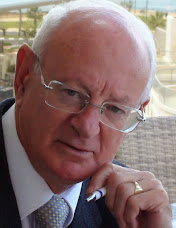The
Definition, and Non-Recognition, of Terrorism.
Original Thinking by Barry Shaw.
The recent 13th World Summit on
Counter-Terrorism, organized by ICT Herzlia, headed by Boaz Ganor, was a
tremendous success.
One of the key factors to the success of this stimulating
event was that it addressed all they key issues in today’s burning and
murderous world.
However, for me, a jarring note was a chance meeting with a
European journalist at one of the conference’s workshops. This reporter has
been based in Israel for two years and her brief was Israel-Palestinian
relations, or lack of them.
Our conversation approached the matter of Palestinian
terrorism at which point she became defensive.
“We don’t call it terrorism. We don’t take sides” was
her knee-jerk response.
I told her that I was one of the co-founders of the Netanya
Terror Victims Organization and asked her what she calls the person who walked
into the Park Hotel in my hometown and blew up over thirty people, mainly
elderly, women, and children, and injured many more. Her answer was that he was
a suicide bomber. I asked if this isn't a terrorist. “No,” she replied, “he
is a fighter.”
By this time the girl was looking for an escape route and
excused herself by telling me she had somewhere to go. Conversation promptly
ended for fear I may convince her otherwise. Some would say she is entitled to
her opinion. But does she?
In the final panel of the conference, which coincidentally
addressed the topic “Defining Terrorism” and to which this journalist
was conspicuous by her absence, I told Boaz Ganor, who chaired the workshop,
that I had encountered a European journalist who was attending his
international conference on counter-terrorism yet is incapable, or unwilling,
to use the term “terrorist” in her articles.
The journalist had told me that she couldn't, or wouldn't,
use that word because she or her journal would not be accused “of taking
sides,” but the mere fact that, for her, a terrorist has morphed into a “fighter”
even when targeting civilians displays a clear case of taking sides. The
use of the word “fighter” goes some way in justifying the motive behind
killing innocent civilians. More grotesquely, it equalizes the perpetrator and
the victims. Such is the perverted
morality of European journalists, and many of their politicians.
Boaz Ganor has a theory for the definition of terrorism. It
is based on the deliberate targeting of civilians for murder for political,
religious, or cultural aims. Ganor differentiates between this and attacks
against military targets which, by his definition, does not constitute an act
of terror.
This theory was met with a robust rejection from Colonel
Richard Kemp, who led British forces in Afghanistan and is a counter-terrorism
advisor to the British Government. In his opinion, the beheading of Lee Rigby,
an off-duty soldier, dressed in civilian clothes, on the streets of Woolwich,
London, by two Islamists on 22 May, 2013, can only be described as an act of
terror.
Boaz Ganor professed that if Hamas were to officially declare
that they will continue to hate Israel, work for its destruction, continue to
target and kill Israeli military personnel, but will renounce and refrain from
targeting civilians, that he would be the first to say that they are no longer
a terrorist organization.
“This,” he said, “would constitute a victory for
counter-terrorism.”
He may have a point but until that day comes the murder of
Israeli civilians by Hamas, Hezbollah, Islamic Jihad, or Al-Qaida continue to unquestionably
be acts of terror.
The international communities’ inability to come up with a
clear or adequate definition of terror is preventing the victims of terror from
having the justice that comes with having their day in court. They cannot successfully bring a case of
terrorism against perpetrators in a legal environment that has no guidance or
clarity in defining what terrorism is.
The failure to properly define terrorism hampers the extradition of
perpetrators for trial and judgment.
A definition that has international recognition is
urgently needed for the sake of justice for the
victims of terror, and for the morality and defense of
nations in which terror is perpetrated.
Barry Shaw is the Special Consultant on Delegitimization
Issues to the Strategic Dialogue Center at Netanya Academic College.
He is also the author of ‘Israel Reclaiming the
Narrative.’ www.israelnarrative.com


No comments:
Post a Comment